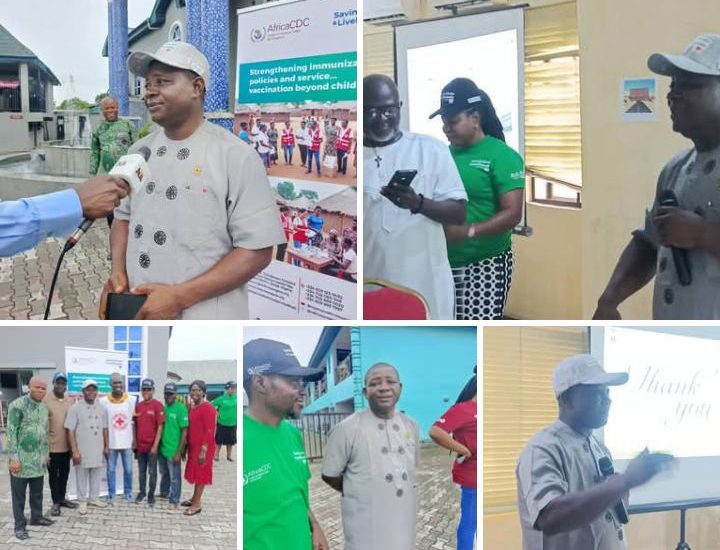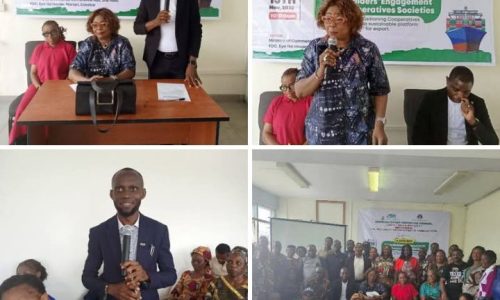RED CROSS TASKS HEALTH EDUCATORS, MEDIA ON ACCURATE HEALTH INFORMATION DISSEMINATION
✓ Assoc. Prof. Valentine Eneji urges trainees to uphold humanitarian principles, accountability, and practical life-saving skills across Cross River’s LGAs
By Amawu, Cletus Albert Amawu.
Calabar, Nigeria — The Branch Chairman of the Nigerian Red Cross Society (NRCS), Cross River State, Assoc. Prof. Valentine Eneji, has charged health educators, Red Cross divisional secretaries, and selected media practitioners across the 18 local government areas to maintain professionalism, accuracy, and accountability in health communication as the state intensifies community sensitisation for immunisation and behavioural change.
Speaking at the closing session of the two-day Training of Trainers (ToT) on Risk Communication and Community Engagement (RCCE) and Social Behaviour Change (SBC) for Immunisation Life Course Approach in Calabar,
Prof. Eneji emphasised that the training was designed not only to build capacity but also to equip participants with practical, life-saving skills necessary to address misinformation and improve community health outcomes.
“We train you in the practical skills and the life-saving skills. Yes, you’ve done some, but we go beyond what you do in the field. That’s why our own training makes a difference,” Eneji stated.
The University don and humanitarian advocate drew attention to the pivotal role of accurate messaging in public health interventions, warning that distorted information could undermine trust and vaccine uptake among communities.
“When there is a distortion in the presentation of your facts, there will be misinformation, and a wrong signal will be sent. People will carry the wrong message,” he cautioned.
Eneji, who is also an Associate Professor of Education at the University of Calabar, underscored the importance of pedagogical clarity and consistency in community education, likening it to effective classroom teaching.
“When you teach and get 99% right but miss one detail, the learner will focus on that one mistake. The same applies in health communication, one wrong message can undo the good work you’ve done,” he noted.
Red Cross Principles and Membership Drive
Highlighting the humanitarian values of the Red Cross, Eneji referenced the organisation’s seven fundamental principles, humanity, impartiality, neutrality, independence, voluntary service, unity, and universality, urging participants to internalise and practise them in their engagements.
“Until you pick our form and become a member, those seven fundamental principles will arrest you. You must become a member,” he said humorously, drawing applause from the audience.
Accountability and Collaboration with Stakeholders
While acknowledging the support of partners such as UNICEF, the AfricanCDC, the National Primary Health Care Development Agency (NPHCDA), and the Cross River State Primary Healthcare Development Agency (CRSPHCDA), Eneji stressed that sustainability and transparency at the local level rest largely on the participants.
“The ownership of this workshop rests mostly on you because you are going back to the field. You must pass the correct message, cross duty barriers, and show accountability,” he asserted.
The Branch Chairman also called for closer synergy between government health officials and Red Cross volunteers, lamenting the lack of cooperation in data sharing and field collaboration.
“Carry the state along, and the state should also remember to carry us along. Our people are in the field working under the sun, yet when we return, others who stayed in their offices want to collect the reports. That must change,” he declared.
Media’s Role in Health Communication
Prof. Eneji particularly commended media practitioners for their participation, describing them as critical partners in advancing public health education. He urged them to prioritise fact-checking, clarity, and empathy in reporting health-related issues.
“The men and women of the media are the third and fourth estates of the realm. Your role is vital, you shape how people understand and respond to health interventions,” he added.
A Call to Action
The training, organised by the Nigerian Red Cross Society, Cross River State Branch, under the Saving Lives and Livelihoods Project, sought to enhance the capacity of local government health educators, social mobilisation officers, and Red Cross divisional secretaries to mobilise communities for immunisation, promote behavioural change, and counter health misinformation.
Participants expressed appreciation for the practical nature of the workshop and pledged to cascade the knowledge to their respective LGAs and communities.
In his closing remarks, Eneji reiterated his commitment to ensuring that Cross River’s Red Cross chapter continues to lead in humanitarian service and health advocacy.
“As you return to your communities, demonstrate what you have learnt, but do it better than we did, and only in the positive direction,” he concluded.
The Nigerian Red Cross Society (NRCS), Cross River Branch, in partnership with UNICEF, Mastercard Foundation, AfricanCDC, and NPHCDA, has been actively supporting the state government’s efforts to build community resilience, promote routine immunisation, and strengthen health communication systems.
The just-concluded ToT is part of a series of initiatives aimed at empowering grassroots health educators with the tools to foster behavioural change, improve vaccine confidence, and enhance public health preparedness across the 18 local government areas of Cross River State.





